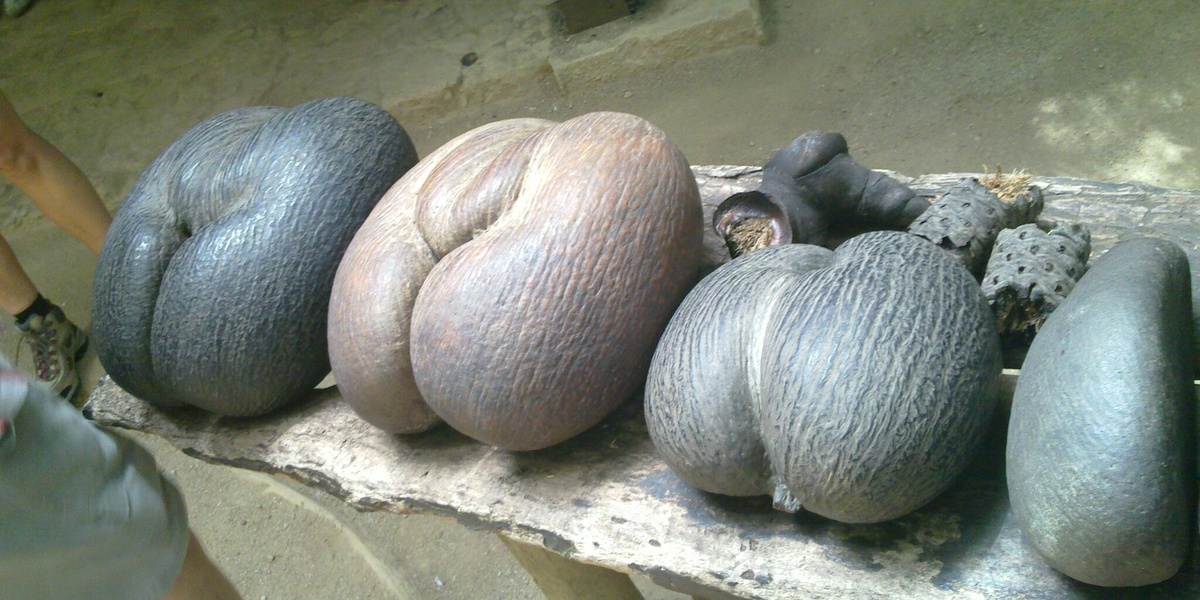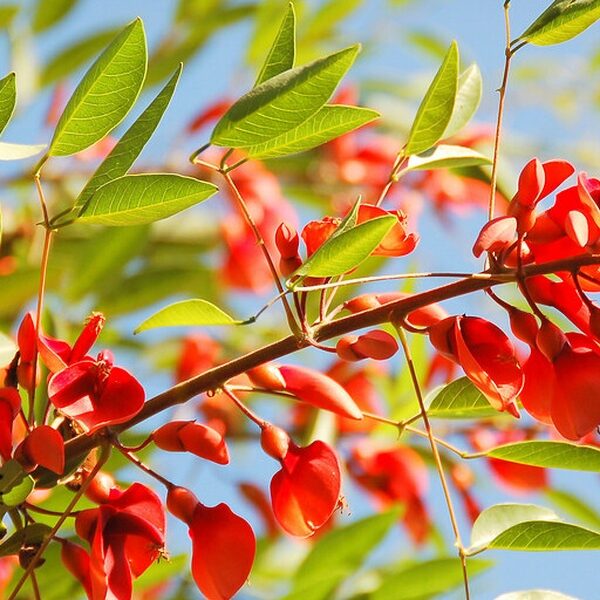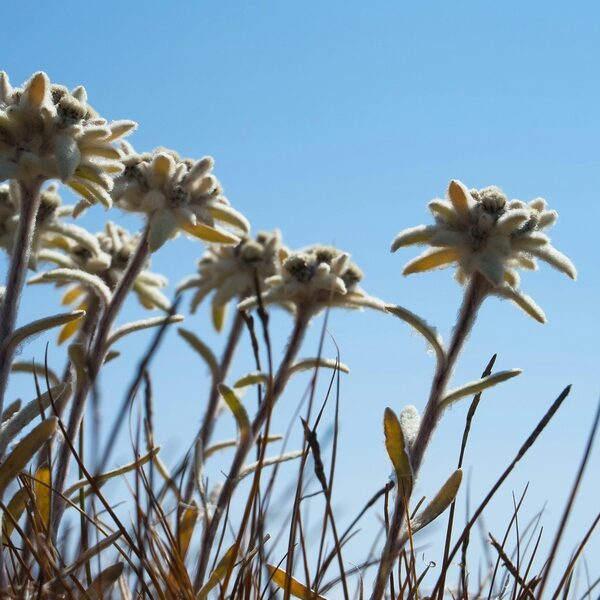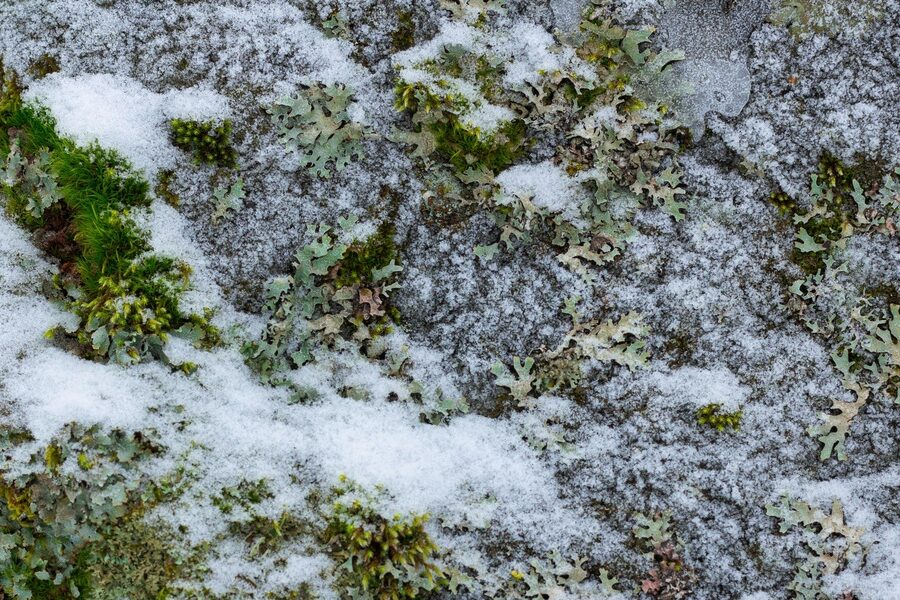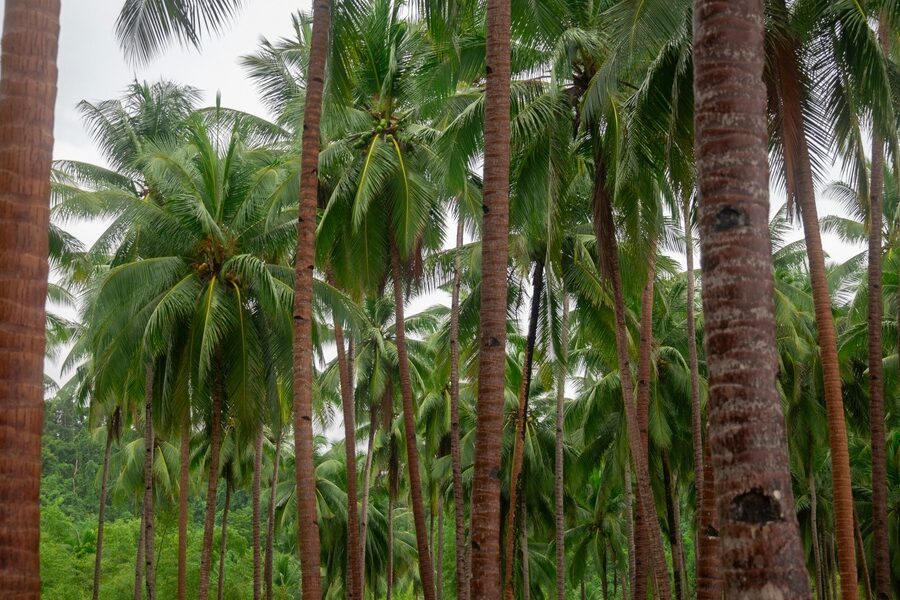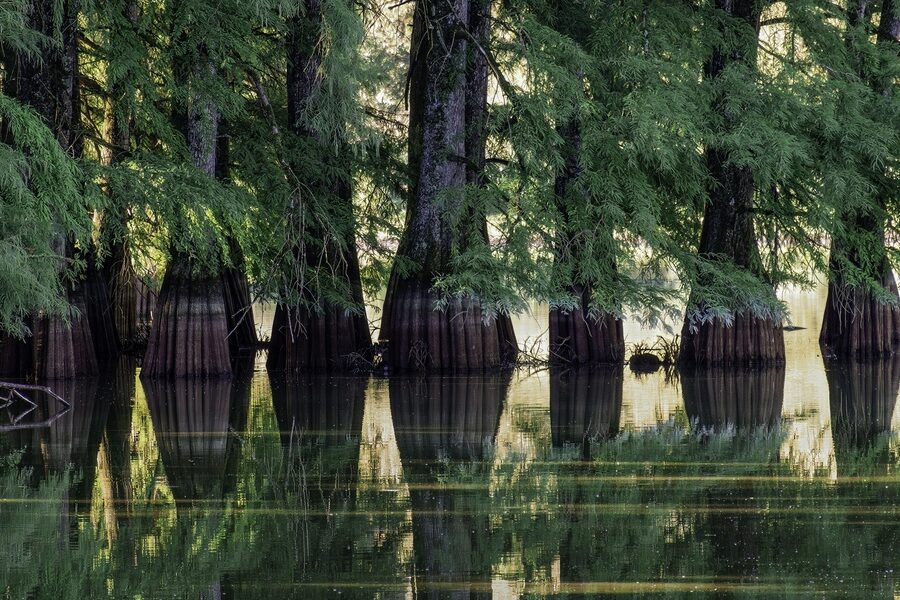The Seychelles archipelago in the western Indian Ocean packs a surprising variety of tree habitats into a small area, from coastal strands and mangroves to upland forests on granitic peaks. Climate, geology and a long history of human influence mean you’ll encounter endemics alongside widespread ornamentals and introduced species.
There are 94 Trees of the Seychelles, ranging from African Tulip Tree to Ylang-Ylang; each entry is organized with Scientific name,Range (islands),Height (m) so you can compare distribution and stature easily — you’ll find the full list below.
Which islands hold the most native tree species?
The inner granitic islands (Mahé, Praslin, La Digue) host the bulk of native and endemic trees because of greater habitat diversity and elevation; outer coral and low islands tend to support fewer natives and more salt-tolerant or introduced species. Check the Range (islands) column to see precise occurrences by island.
How can I identify common Seychelles trees in the field?
Focus on leaf shape, flower or scent (Ylang-Ylang is notably fragrant), fruit or seed form, and typical height; use the Scientific name and Height (m) columns to confirm sightings, and compare habitat notes. A local field guide or photo app plus respect for protected species will make identification more reliable.
Trees of the Seychelles
| Common name | Scientific name | Range (islands) | Height (m) |
|---|---|---|---|
| Coco de Mer | Lodoicea maldivica | Endemic to Praslin and Curieuse islands | 30 |
| Jellyfish Tree | Medusagyne oppositifolia | Endemic to a few granite hillsides on Mahé island | 10 |
| Seychelles Stilt Palm | Verschaffeltia splendida | Endemic to Mahé, Silhouette, and Praslin islands | 25 |
| Thief Palm | Phoenicophorium borsigianum | Endemic to Mahé, Praslin, Silhouette, La Digue, and Frégate | 15 |
| Latanier Palm | Roscheria melanochaetes | Endemic to Mahé, Praslin, and Silhouette islands | 10 |
| Cabbage Palm | Deckenia nobilis | Endemic to Mahé, Praslin, Silhouette, Curieuse, and Félicité | 40 |
| Bois de Fer | Vateriopsis seychellarum | Endemic to Mahé island | 30 |
| Wright’s Gardenia | Rothmannia annae | Endemic to Aride Island | 6 |
| Bwa Rouz | Dillenia ferruginea | Endemic to Mahé, Praslin, Silhouette, and Curieuse | 20 |
| Kapisen | Northea hornei | Endemic to Mahé, Praslin, and Silhouette islands | 25 |
| Bwa Blan | Hernandia nymphaeifolia | Native to coastal areas of Mahé, Praslin, La Digue, and outer islands | 20 |
| Indian Almond | Terminalia catappa | Native to coastal strands on granitic and coralline islands | 35 |
| Takamaka | Calophyllum inophyllum | Native to coastlines of most Seychelles islands | 25 |
| Veloutier | Scaevola taccada | Native to coastal areas on almost all islands | 4 |
| Bois de Natte | Mimusops sechellarum | Endemic to Mahé, Praslin, Silhouette, and Curieuse | 20 |
| Bwa Sagay | Canthium bibracteatum | Endemic to Mahé, Silhouette, Praslin, and La Digue | 10 |
| Bwa Sandal | Santaloides seychellarum | Endemic to Mahé, Praslin, Silhouette, and La Digue | 15 |
| Vacoa Parasol | Pandanus sechellarum | Endemic to Mahé, Praslin, and Silhouette islands | 20 |
| Vacoa Marron | Pandanus hornei | Endemic to Mahé, Praslin, and Silhouette islands | 25 |
| Vacoa de Riviere | Pandanus multispicatus | Endemic to Mahé, Praslin, and Silhouette islands | 15 |
| Cinnamon | Cinnamomum verum | Naturalized on Mahé, Praslin, and Silhouette | 15 |
| Albizia | Falcataria moluccana | Naturalized on Mahé, Praslin, and Silhouette | 40 |
| Sandalwood | Adenanthera pavonina | Naturalized on Mahé and other granitic islands | 20 |
| Bodamier | Terminalia bentzoe | Endemic to Mauritius, but naturalized in Seychelles | 20 |
| Casuarina | Casuarina equisetifolia | Naturalized along coastlines of most islands | 35 |
| Breadfruit | Artocarpus altilis | Naturalized, widespread on main granitic islands | 20 |
| Jackfruit | Artocarpus heterophyllus | Naturalized on main granitic islands, near settlements | 25 |
| Flamboyant Tree | Delonix regia | Naturalized in lowland areas of Mahé, Praslin, La Digue | 18 |
| Bwa Zoliker | Pittosporum senacia | Endemic to Mahé and Silhouette islands | 8 |
| Bwa Kalou | Memecylon elaeagni | Endemic to Mahé, Praslin, and Silhouette | 7 |
| Bois Cassant | Timonius sechellensis | Endemic to Mahé, Silhouette, Praslin, and La Digue | 15 |
| Café Marron | Erythroxylum sechellarum | Endemic to Mahé and Silhouette islands | 5 |
| Bwa Dir | Ixora sechellensis | Endemic to Mahé and Silhouette | 6 |
| Bwa Tourterelle | Morinda citrifolia | Native to coastlines and lowland areas | 9 |
| Bwa Malgash | Gynura sechellensis | Endemic to Mahé island | 3 |
| Bwa Mare | Allophylus sechellensis | Endemic to Mahé, Praslin, Silhouette | 10 |
| Mapou | Pisonia grandis | Native to coralline islands like Aldabra and Bird Island | 20 |
| Guava | Psidium guajava | Naturalized, especially on Mahé and Praslin | 10 |
| Mango | Mangifera indica | Naturalized in lowland areas of main granitic islands | 30 |
| Bwa Zonn | Soulamea terminalioides | Endemic to Mahé, Silhouette, and Praslin | 12 |
| Bwa Monper | Syzygium wrightii | Endemic to Mahé, Silhouette, Praslin, and Félicité | 20 |
| Bwa Merl | Syzygium sechellarum | Endemic to Mahé and Silhouette islands | 15 |
| Wild Cinnamon | Cinnamosma sechellarum | Endemic to Mahé and Silhouette islands | 5 |
| Bwa Kasan | Grisollea thomasiana | Endemic to Mahé, Praslin, Silhouette, and La Digue | 15 |
| Bwa Saponer | Trilepisium gymnandrum | Endemic to Mahé and Silhouette | 20 |
| Bwa Koulev | Psychotria pervillei | Endemic to Mahé, Silhouette, and Praslin | 6 |
| Milkwood | Tabernaemontana coffeoides | Native to Seychelles and other Indian Ocean islands | 8 |
| Coco-Marron | Curculigo sechellensis | Endemic to Mahé, Praslin, and Silhouette | 4 |
| Philodendron | Philodendron spp. | Naturalized in forests of Mahé, Praslin, Silhouette | 15 |
| Bwa Dou | Craterispermum microdon | Endemic to Mahé and Silhouette | 10 |
| Gayak | Afrocarpus falcatus | Introduced, planted in forestry trials | 30 |
| Santol | Sandoricum koetjape | Naturalized in lowland areas of Mahé | 25 |
| Bwa Sitron | Euodia hortensis | Naturalized in some areas on Mahé and Praslin | 7 |
| Jamalac | Syzygium samarangense | Naturalized in lowland areas, near settlements | 12 |
| Tecoma | Tabebuia heterophylla | Naturalized in lowland and coastal areas | 20 |
| Bwa Kannel | Ocotea insularis | Endemic to Mahé and Silhouette | 20 |
| Bwa Soung | Fagraea berteroana | Native to coasts and lowlands | 15 |
| Ylang-Ylang | Cananga odorata | Naturalized on Mahé, Praslin, La Digue | 25 |
| Bwa de Table | Heritiera littoralis | Native to coastal wetlands and mangrove edges | 20 |
| Mangrove Blanc | Avicennia marina | Native to mangrove swamps on granitic and outer islands | 15 |
| Mangrove Lafourch | Rhizophora mucronata | Native to mangrove swamps on granitic and outer islands | 25 |
| Mangrove Kolye | Bruguiera gymnorhiza | Native to the landward side of mangrove forests | 30 |
| Mangrove Zonn | Ceriops tagal | Native to mangrove swamps | 8 |
| Badamier | Terminalia arjuna | Introduced and planted along roads | 25 |
| Bwa Lezar | Pterocarpus indicus | Naturalized in some lowland areas | 30 |
| Jamrosa | Syzygium jambos | Naturalized along rivers and in moist valleys | 15 |
| Avocado | Persea americana | Naturalized in agricultural and secondary forest areas | 20 |
| African Tulip Tree | Spathodea campanulata | Naturalized, particularly in disturbed areas | 25 |
| Bwa Mapou | Ficus reflexa & Ficus rubra | Native to granitic islands | 20 |
| Bwa Zak | Zanthoxylum paniculatum | Endemic to Silhouette island | 10 |
| Bois Canon | Trema orientalis | Native pioneer species in disturbed areas | 10 |
| Bwa Mizer | Dracaena reflexa | Native to forests on granitic islands | 8 |
| Bwa Citronelle | Leptadenia anastomosans | Endemic to Aldabra atoll | 5 |
| Bwa Tang | Cryptocarya hornei | Endemic to Mahé island | 15 |
| Bwa Mourt | Ochna kirkii | Native to coastal woodlands | 6 |
| Bwa Blan Kalou | Suregada boiviniana | Native to coastal and dry forests | 7 |
| Vakwa Kant | Pandanus balfourii | Endemic to Mahé, Praslin, Silhouette, La Digue | 18 |
| Bwa Maré | Ochrosia oppositifolia | Native to coastal areas of granitic and coralline islands | 15 |
| Bwa Koray | Tournefortia argentea | Native to sandy beaches of most islands | 10 |
| Pomme d’Amour | Anacardium occidentale | Naturalized in lowland, dry areas | 12 |
| Bwa Zako | Annona muricata | Naturalized near settlements | 8 |
| Figye Banann | Ficus nautarum | Endemic to Mahé, Silhouette, Praslin, La Digue, Félicité | 25 |
| Bwa Koko | Barringtonia asiatica | Native to coastlines of most islands | 20 |
| Bwa Gato | Glochidion littorale | Native to coastal marshes and riverbanks | 8 |
| Bwa Ker | Intsia bijuga | Native to coastal and lowland forests | 40 |
| Bwa Kasan Gran Fey | Macaranga sechellensis | Endemic to Mahé, Praslin, Silhouette | 15 |
| Bwa Le Seve | Nephrosperma vanhoutteanum | Endemic to Mahé, Praslin, Silhouette, La Digue, Félicité | 12 |
| Bwa Fow | Drypetes sechellensis | Endemic to Mahé, Silhouette, Praslin | 15 |
| Kafe Sovaz | Paragenipa wrightii | Endemic to Mahé, Praslin, Silhouette, Curieuse | 10 |
| Bwa Rouj | Erythroxylum laurifolium | Endemic to Mahé and Silhouette | 8 |
| Bwa Dyanmanti | Homalium sechellarum | Endemic to Mahé and Silhouette | 20 |
| Le Manglier | Lumnitzera racemosa | Native to mangrove swamps | 10 |
| Bwa Pti Fey | Eugenia sechellarum | Endemic to Mahé, Praslin, Silhouette | 10 |
| Frangipani | Plumeria rubra | Naturalized in coastal and lowland areas | 8 |
Images and Descriptions
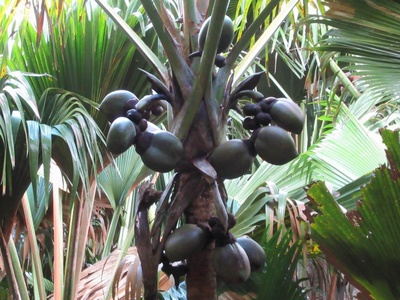
Coco de Mer
A giant palm famous for bearing the world’s largest seed. Found only in the Vallée de Mai on Praslin and on Curieuse. This iconic species is Endangered but is now highly protected and a major tourist attraction.
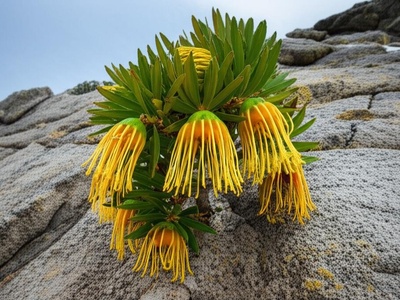
Jellyfish Tree
One of the world’s rarest trees, once thought extinct. Its flowers resemble a jellyfish’s tentacles. It is Critically Endangered and survives on only a few exposed granite slopes, highlighting its extreme rarity.
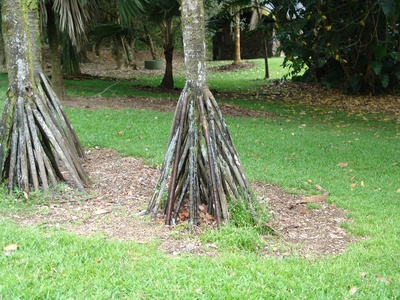
Seychelles Stilt Palm
A magnificent palm known for its prominent stilt roots that anchor it to steep hillsides. It has an undivided, spiny leaf when young. It is a Near Threatened species found in moist mountain forests.
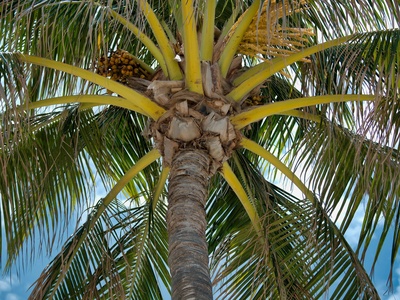
Thief Palm
A spiny palm with large, wedge-shaped leaves that are split at the ends. Its name comes from the belief that its spiny trunk deterred thieves. It is widespread in forests from sea level to mountain tops.
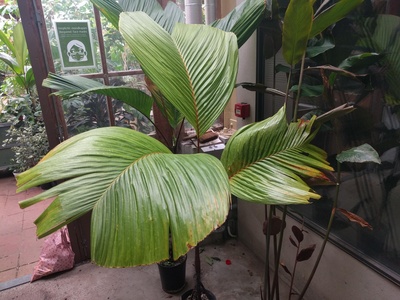
Latanier Palm
A slender, elegant understory palm with a spiny trunk and irregularly divided leaves. It prefers shady, moist forests at higher altitudes and is considered Near Threatened due to habitat loss.
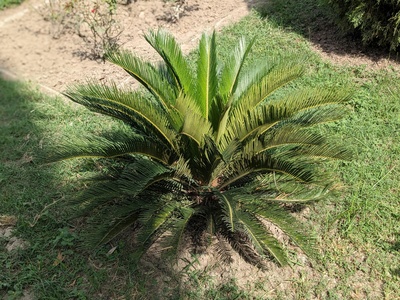
Cabbage Palm
The tallest endemic palm, known for its edible ‘palm heart’ or cabbage. It has a smooth, slender trunk ringed with leaf scars and a crown of feathery leaves. It is a Vulnerable species, now protected.
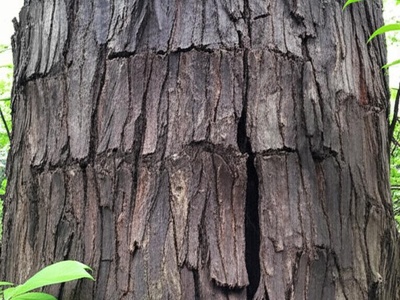
Bois de Fer
A large, slow-growing hardwood tree in the dipterocarp family, once heavily logged. It is Critically Endangered, with only a few hundred individuals remaining in the Morne Seychellois National Park.
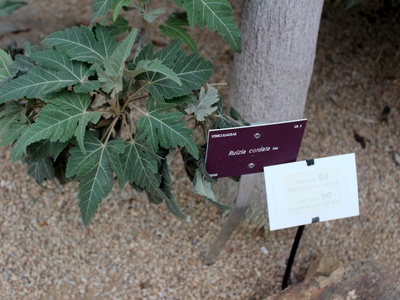
Wright’s Gardenia
A small, beautiful tree famous for its fragrant, creamy-white flowers that turn yellow with age. It is Critically Endangered, with its main wild population protected on the nature reserve of Aride Island.
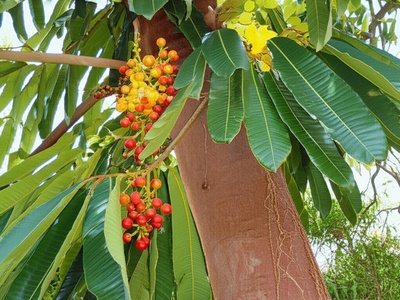
Bwa Rouz
A common endemic tree in mid-altitude forests, easily recognized by its large, leathery, corrugated leaves and reddish, flaky bark. Its large yellow flowers are followed by fleshy, reddish fruits.

Kapisen
A large forest tree with a dense crown, producing a milky latex. Its large, hard-shelled fruits contain an edible, oil-rich seed. It is a key species in high-altitude forests and is currently listed as Vulnerable.
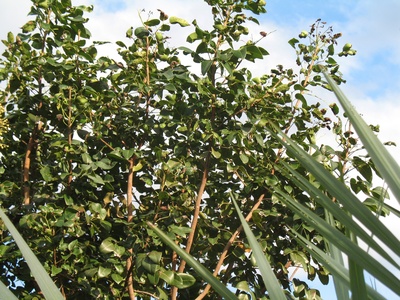
Bwa Blan
A common coastal tree with large, heart-shaped leaves and distinctive lantern-like fruits. It is salt-tolerant and often found just behind the beach crest, providing important shoreline stability.
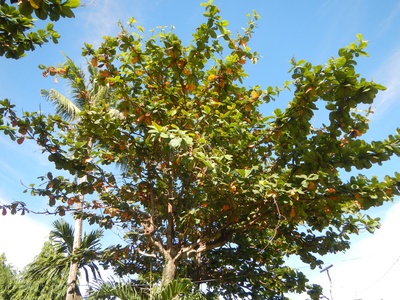
Indian Almond
A large, spreading tree with leaves that turn bright red before falling. It provides excellent shade and produces an edible, almond-like nut. It is a very common and important coastal species throughout the Seychelles.
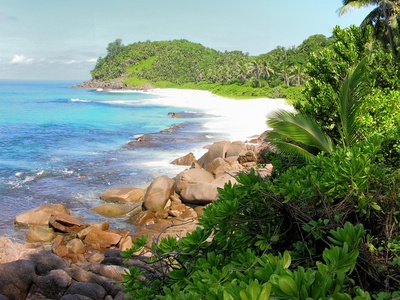
Takamaka
A beautiful, broad-leaved coastal tree with a spreading crown, known for its hard, durable wood and fragrant white flowers. Its round, green fruits are dispersed by sea currents. It is a vital species for coastal protection.
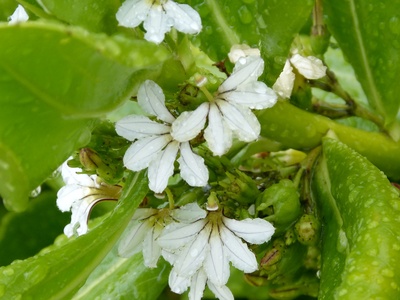
Veloutier
Though often a large shrub, it can form small trees on shorelines. It has fleshy leaves and small white flowers, playing a crucial role in stabilizing sandy beaches and dunes against erosion.
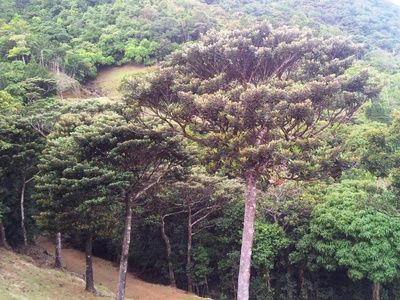
Bois de Natte
A large, slow-growing hardwood tree found in coastal and mid-altitude forests. It produces a sweet, edible fruit and has a milky sap. The species is listed as Vulnerable due to historical exploitation for its timber.
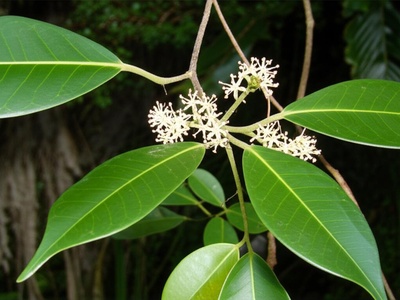
Bwa Sagay
A small to medium-sized tree found in forests from low to high altitudes. It is characterized by its opposite leaves and small, white, fragrant flowers. An important component of the native forest ecosystem.
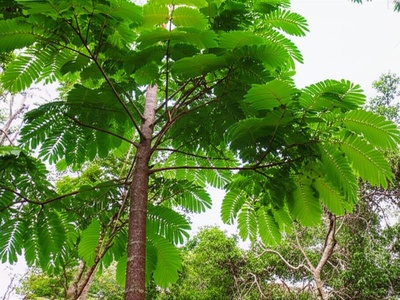
Bwa Sandal
A medium-sized tree with compound leaves, belonging to the same family as the lychee. It grows in forests at various altitudes and is an important part of the native flora, though not widely known by visitors.
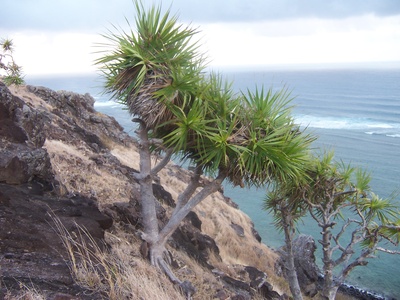
Vacoa Parasol
A distinctive screwpine with a tall, single trunk and a compact, umbrella-like crown of leaves. It’s often found on rocky slopes and in marshy areas in higher altitude forests. The species is Near Threatened.
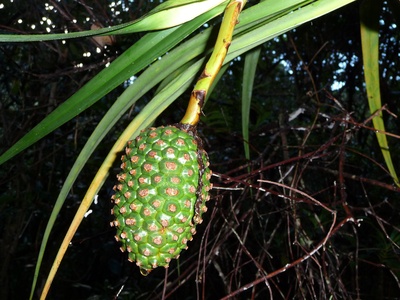
Vacoa Marron
A large, branching screwpine forming dense thickets on mountain slopes. It is supported by a robust system of stilt roots. A dominant species in many high-altitude cloud forests.
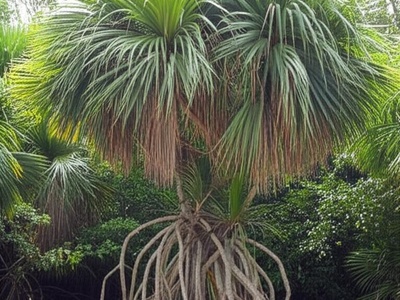
Vacoa de Riviere
A screwpine found along rivers and in marshy areas, often forming dense, impenetrable stands. It has a branching habit and numerous stilt roots that anchor it in wet ground.
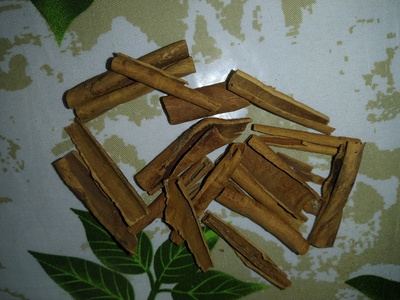
Cinnamon
Originally introduced for spice production, this species is now a highly invasive tree in the mountain forests, outcompeting native flora. It’s identified by its aromatic bark and leaves with three prominent veins.
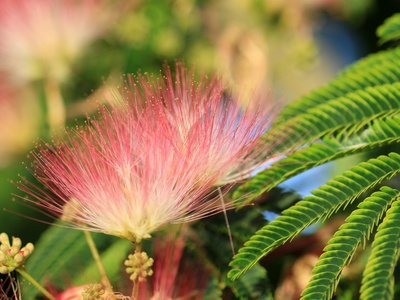
Albizia
A very fast-growing, large tree introduced for forestry. It has become invasive, particularly in disturbed areas and forest gaps, where its brittle branches pose a risk. It has feathery, compound leaves.

Sandalwood
A medium-sized tree, introduced and now common in secondary forests. It is best known for its bright red, lens-shaped seeds (‘saga’ seeds) that are used in jewelry and crafts.
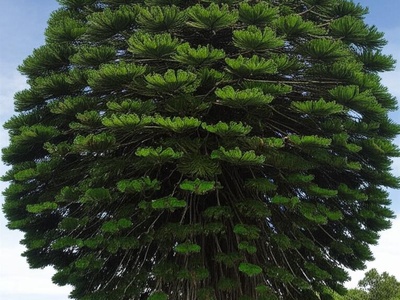
Bodamier
A tall tree with a layered, pagoda-like branching structure. It is often found in coastal and lowland areas, having been introduced long ago. Its leaves are clustered at the branch tips.
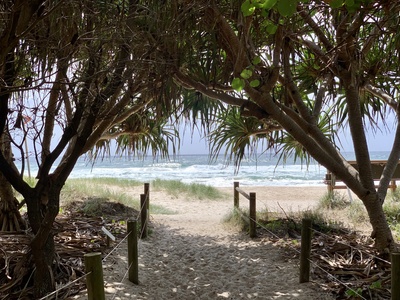
Casuarina
A tall, pine-like tree with drooping, needle-like branchlets. It was widely planted to prevent coastal erosion but has become invasive, particularly on sandy cays where it displaces native vegetation.
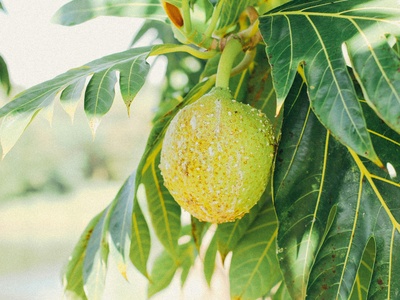
Breadfruit
A large tree with distinctive, deeply lobed leaves, introduced for its starchy fruit. It is now a key part of Seychelles cuisine and is thoroughly naturalized in secondary forests and on abandoned land.
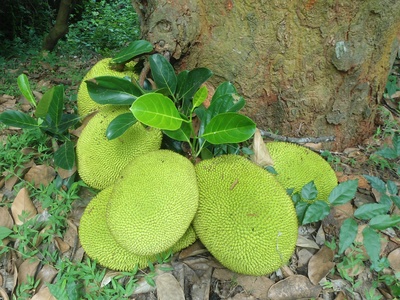
Jackfruit
A large tree known for producing the world’s largest tree-borne fruit directly on its trunk and branches. Introduced for food, it is now found naturalized in many lowland areas.
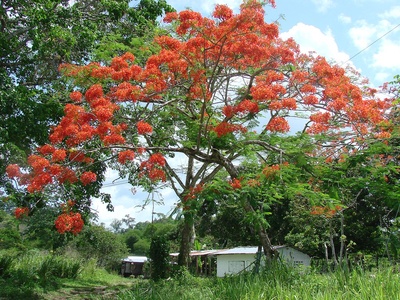
Flamboyant Tree
An ornamental tree from Madagascar, now widely naturalized. It is famous for its brilliant scarlet-orange flowers that cover the entire canopy in summer, and its long, woody seed pods.
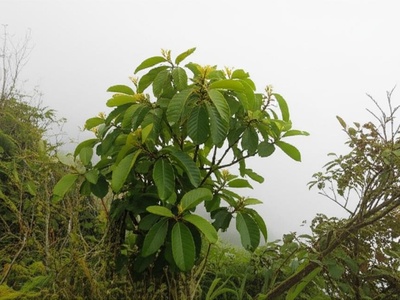
Bwa Zoliker
A small, rare tree found in misty high-altitude forests. It has glossy leaves and produces small, fragrant flowers. This Vulnerable species is restricted to just a few remote mountain locations.
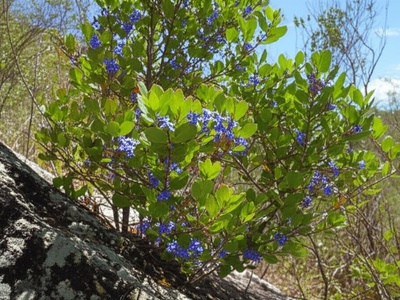
Bwa Kalou
A small tree or large shrub found in forests, often on rocky outcrops. It is characterized by its small, leathery leaves and clusters of tiny, attractive blue or purple flowers.
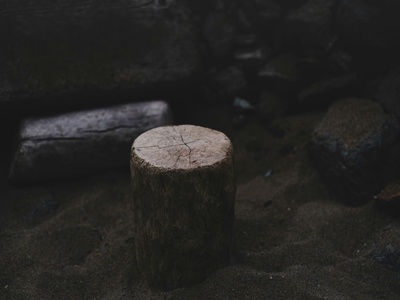
Bois Cassant
A common pioneer tree in secondary forests and cleared areas. It has brittle wood, giving it its name ‘breaking wood’. It plays a key role in the early stages of forest regeneration.
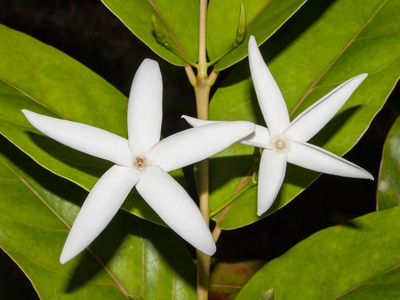
Café Marron
A small, slender tree found in the understory of high-altitude forests. It has glossy green leaves and small white flowers. This species is listed as Vulnerable due to its restricted range.
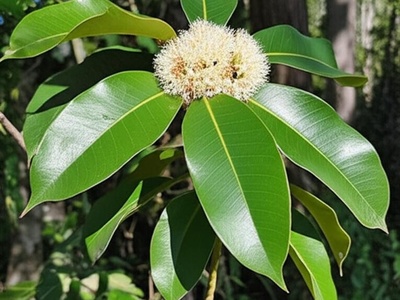
Bwa Dir
A small tree with hard wood (‘Bwa Dir’) found in forests. It has large, leathery leaves and produces clusters of white flowers. It is an uncommon species, listed as Near Threatened.
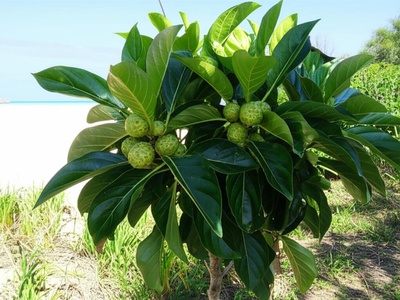
Bwa Tourterelle
Also known as Noni, this small tree is found in coastal vegetation. It is easily recognized by its large, glossy leaves and lumpy, pungent fruit, which is used in traditional medicine.
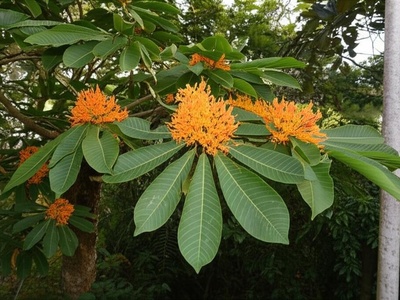
Bwa Malgash
A very rare, small tree or shrub, Critically Endangered and found only at a few sites in the cloud forest of Mahé. It has large, soft leaves and clusters of orange-yellow flowers.
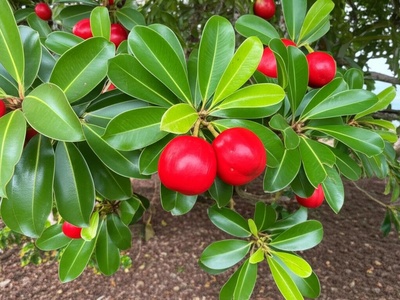
Bwa Mare
A small to medium-sized tree found in lowland and coastal forests. It has distinctive trifoliate leaves (leaves in groups of three). It is an important part of the native coastal ecosystem.
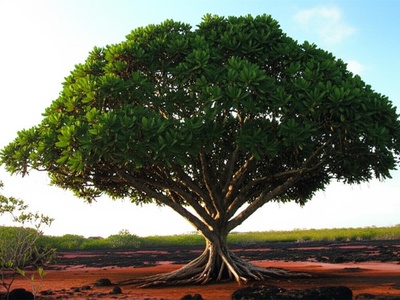
Mapou
A soft-wooded tree that is a vital nesting site for seabirds. Its sticky fruits can fatally entrap birds. It forms magnificent forests on phosphatic soils, particularly on outer islands.
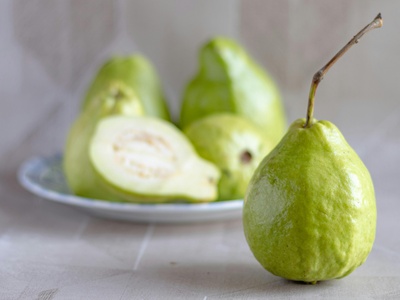
Guava
A small, fruit-bearing tree from the Americas, now a widespread invasive species in Seychelles. It forms dense thickets in open areas and forest understories, suppressing native plant growth.
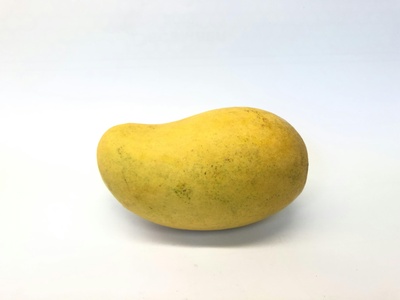
Mango
The classic mango tree, introduced for its fruit, is now widely naturalized. Large, old trees are common features in settled areas and on former plantations, providing fruit and shade.
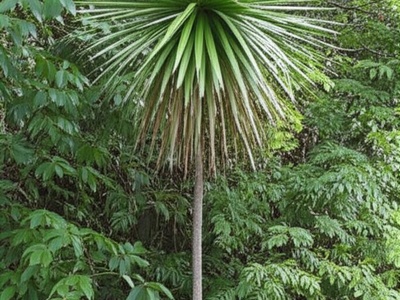
Bwa Zonn
A slender, unbranched or sparsely branched treelet with a rosette of large leaves at the top, resembling a small palm. It is found in shady, humid forests, usually at higher altitudes.
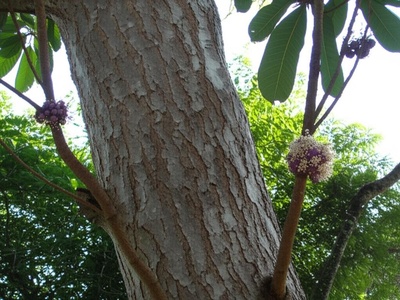
Bwa Monper
A common forest tree, especially at higher altitudes. It has smooth bark and produces small, white, fluffy flowers followed by fleshy purple fruits that are eaten by birds like the Seychelles Bulbul.
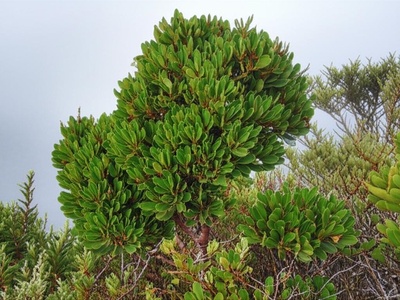
Bwa Merl
A rare tree found only in the high-altitude cloud forests. It is characterized by its small, thick, rounded leaves. This Vulnerable species is adapted to the wet, misty conditions of the mountain peaks.

Wild Cinnamon
A small, aromatic understory tree, not related to true cinnamon. Its leaves and bark have a peppery scent. It is a rare and Vulnerable species found only in high-altitude cloud forest.
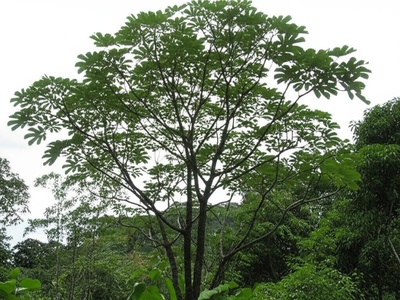
Bwa Kasan
A medium-sized tree of lowland to mid-altitude forests. It has simple, alternate leaves and is part of the under-recognized native flora. Its wood is known to be brittle.

Bwa Saponer
A large tree found in mountain forests. It belongs to the fig family and produces a milky latex. The species is considered rare and is listed as Vulnerable.
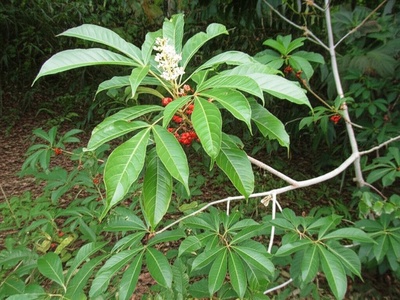
Bwa Koulev
A small understory tree common in native forests. It has whorled leaves and produces small white flowers followed by red or black berries, which are an important food source for birds.
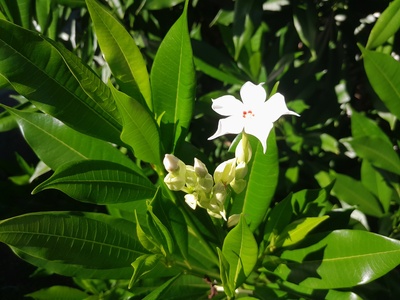
Milkwood
A small tree with glossy, dark green leaves and white, pinwheel-shaped, fragrant flowers. It produces a milky sap when cut. Found in coastal and lowland forests.
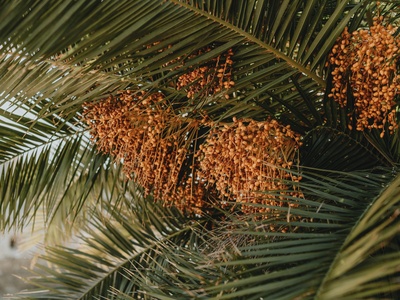
Coco-Marron
A palm-like plant that can form a small tree-like trunk over time. It has large, pleated leaves emerging from the ground or a short stem. Found on the forest floor in shady areas.
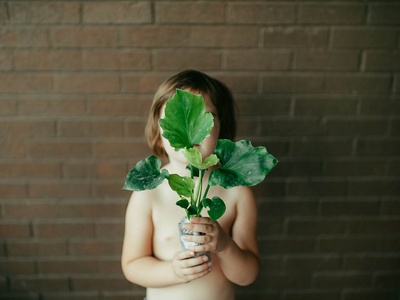
Philodendron
Though a vine, invasive species like *P. scandens* grow up trees to great heights, forming thick, woody stems that function like part of the tree canopy, smothering their hosts. Widespread in mountain forests.
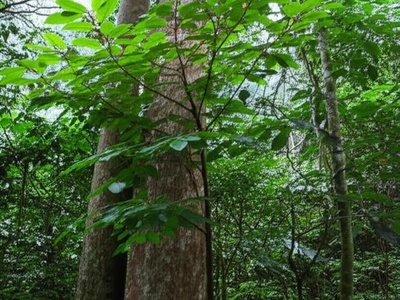
Bwa Dou
A small to medium-sized tree found in intermediate and high-altitude forests. It is an understory species that contributes to the complex structure of the native cloud forest.

Gayak
An African coniferous tree, also known as Yellowwood. It was introduced for forestry and can be found in some upland areas like the Salazie trail on Mahé, though it is not widely naturalized.
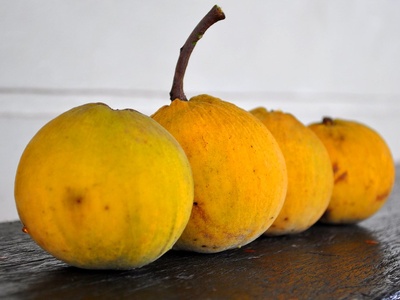
Santol
Introduced from Southeast Asia for its edible fruit, which is sweet to sour. This large tree is now naturalized in some secondary forests and near old settlements. It has trifoliate leaves.
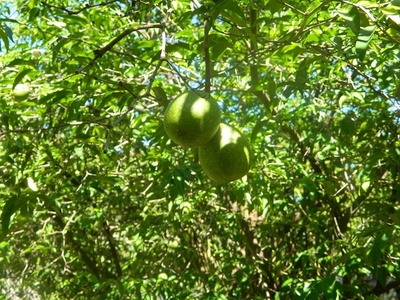
Bwa Sitron
A small tree or large shrub introduced for its aromatic leaves, which have a strong citrus-like scent. It has escaped cultivation and can be found along trails and in disturbed forest.
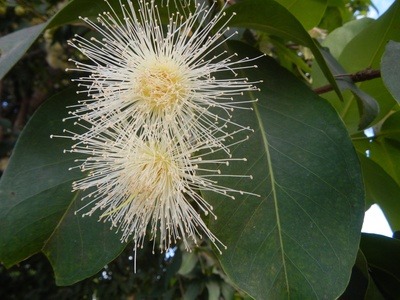
Jamalac
Also known as the Wax Apple, this tree was introduced for its bell-shaped, waxy fruit. It has naturalized in moist lowland areas and is often found near rivers and old plantations.
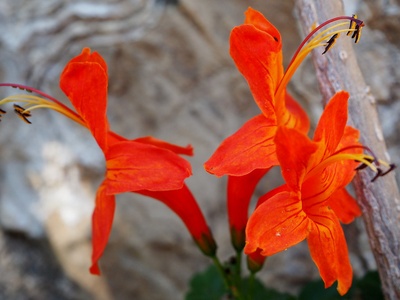
Tecoma
A fast-growing ornamental tree from the Caribbean, now naturalized in many coastal areas. It is easily recognized by its clusters of large, pink to white, trumpet-shaped flowers.
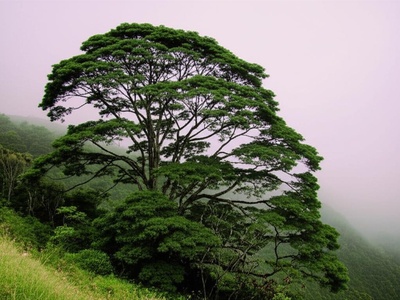
Bwa Kannel
A large canopy tree in the high-altitude forests. It is a member of the laurel family, with aromatic properties. This Vulnerable species is an important component of the misty cloud forests.
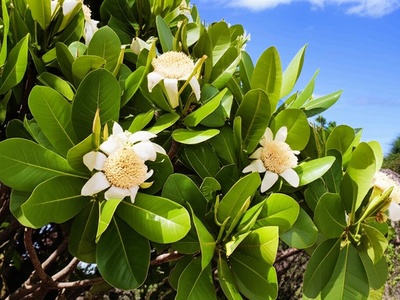
Bwa Soung
A tree with large, leathery leaves and very fragrant, creamy-white flowers that open at night. It is often found in coastal woodlands and is important for native pollinators like moths.
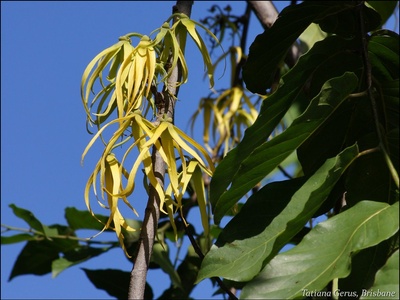
Ylang-Ylang
Introduced for its intensely fragrant flowers used in perfumes, this tree is now widely naturalized in secondary forests. It has a drooping, untidy appearance with long, twisted, yellow-green petals.

Bwa de Table
Known as Looking-glass Tree because of the silvery scales on the underside of its leaves. It has distinctive boat-shaped, keeled fruits and often grows near mangrove habitats.
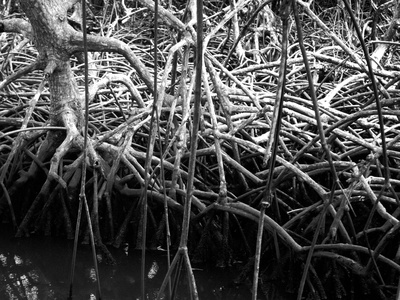
Mangrove Blanc
A key mangrove species, characterized by its pencil-like aerial roots (pneumatophores) that stick up from the mud. It is highly salt-tolerant and colonizes tidal flats.
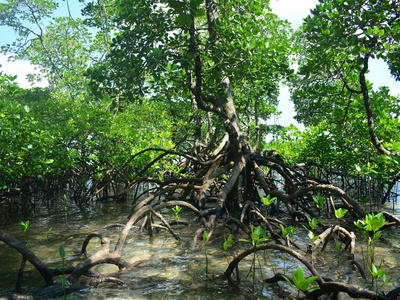
Mangrove Lafourch
A classic mangrove identified by its extensive network of arching prop roots that support it in the soft mud. It plays a critical role as a fish nursery and in coastal protection.
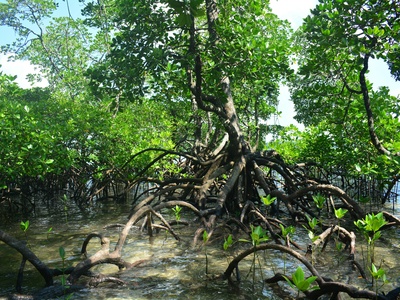
Mangrove Kolye
A tall mangrove species found in less frequently inundated areas. It has a buttressed trunk and ‘knee roots’ that loop above the mud. Its flowers are pollinated by birds.
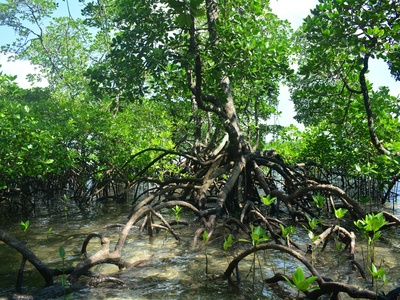
Mangrove Zonn
A smaller mangrove tree or shrub, often forming dense thickets in the middle to upper intertidal zones. It is characterized by its slender form and buttressed base.
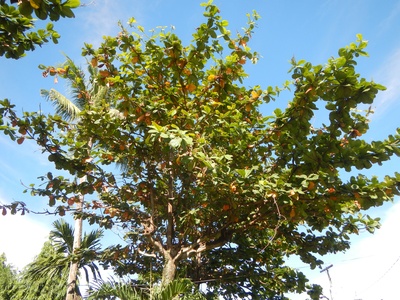
Badamier
A large, buttressed tree often planted as a roadside ornamental for its wide, shady canopy. Not to be confused with the native Indian Almond (*T. catappa*), though similar in appearance.

Bwa Lezar
A large deciduous tree, also known as Narra. Introduced for its high-quality timber, it is now found naturalized in some areas. It produces fragrant yellow flowers and disc-shaped, winged pods.
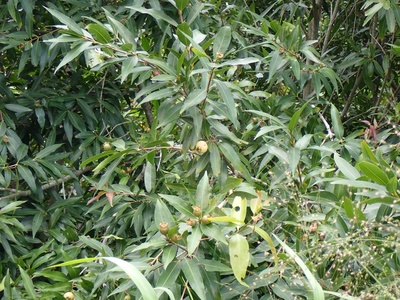
Jamrosa
Also known as Rose Apple, this tree is invasive in moist, riparian habitats. It produces a crisp, edible fruit that smells of roses, and forms dense stands that shade out native species.
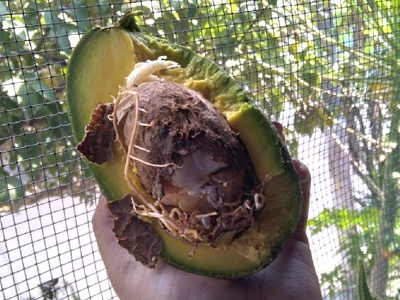
Avocado
Introduced for its fruit, the avocado tree has become widely naturalized. It thrives in the Seychelles climate and can be found growing semi-wild in many upland and lowland areas.
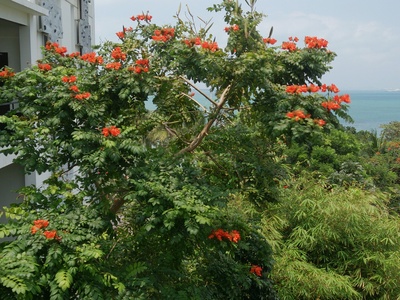
African Tulip Tree
A highly invasive ornamental tree known for its large, vibrant orange-red, cup-shaped flowers. It spreads aggressively and outcompetes native vegetation, especially in cleared land.
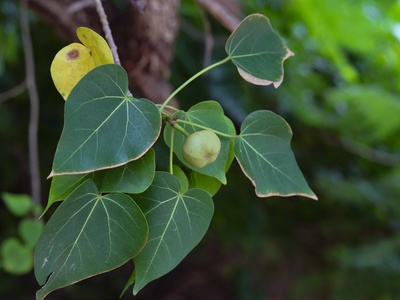
Bwa Mapou
Native fig trees, often starting as epiphytes. They develop into large trees with extensive aerial root systems. They are keystone species, providing fruit for birds and flying foxes.

Bwa Zak
A rare, small, spiny tree found only on Silhouette. It belongs to the citrus family and has aromatic leaves. It is a Critically Endangered species with a very small population.
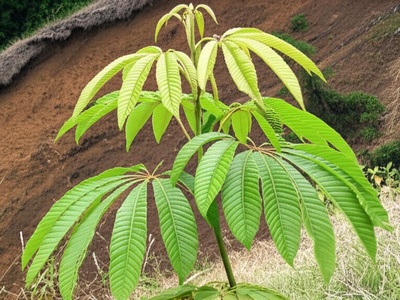
Bois Canon
A very fast-growing, short-lived tree that quickly colonizes landslides and cleared areas. It has serrated leaves and provides food for birds, playing a role in forest regeneration.
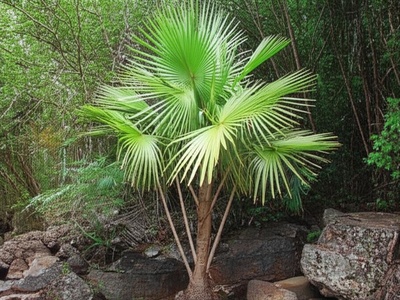
Bwa Mizer
A slow-growing, tree-like monocot with strap-like leaves clustered at the branch tips. Often found in the forest understory, particularly on rocky ground and along rivers.
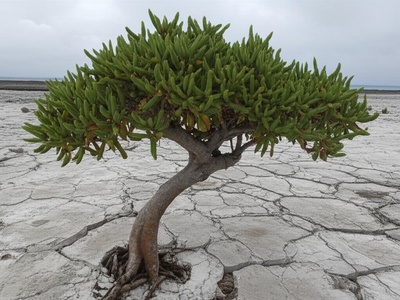
Bwa Citronelle
A small, gnarled tree found only on the harsh limestone terrain of Aldabra. It is well-adapted to the dry, salty conditions of the atoll. A key part of Aldabra’s unique flora.

Bwa Tang
A rare tree from the laurel family, found only in the higher-altitude forests of Mahé. It is a Vulnerable species, threatened by habitat degradation and invasive plants.
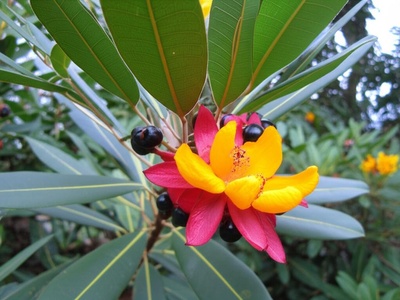
Bwa Mourt
A small tree or shrub with glossy leaves, known for its attractive yellow flowers. After flowering, the red sepals persist, surrounding the black, berry-like fruits, creating a striking display.
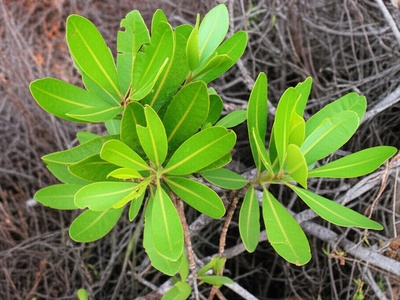
Bwa Blan Kalou
A small tree with leathery leaves, often found in the drier woodlands of the granitic islands and also on some of the outer islands like Aldabra.
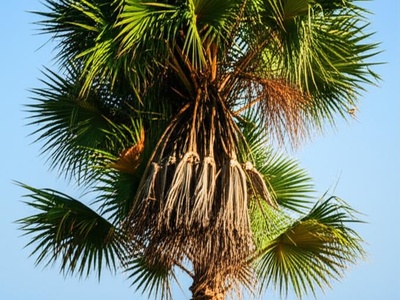
Vakwa Kant
A common and widespread screwpine, often found in coastal areas and river valleys. It is a robust, branching species with prominent stilt roots and saw-toothed leaves.
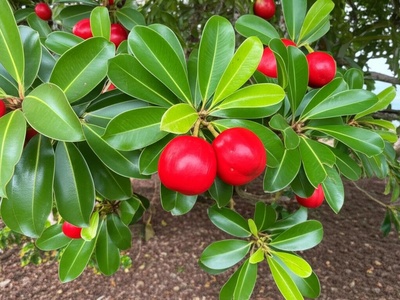
Bwa Maré
A coastal tree with glossy leaves that grow in whorls. It produces large, paired, bright red fruits that are buoyant and sea-dispersed, often mistaken for a type of mango.
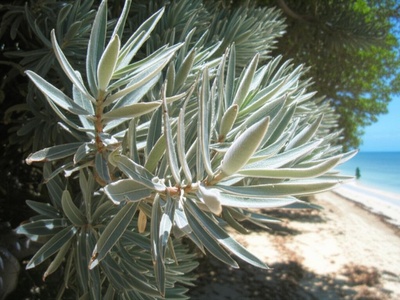
Bwa Koray
Also known as the Velvetleaf Soldierbush, this tree has distinctive leaves covered in silvery, silky hairs. It is a pioneer species on sandy shores, helping to stabilize beaches.
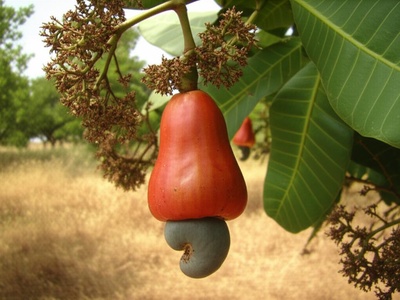
Pomme d’Amour
The Cashew tree, introduced for its nut, has become naturalized in some drier, open areas. It is a spreading tree, easily recognized by its ‘cashew apple’ (a swollen stalk) and kidney-shaped nut.
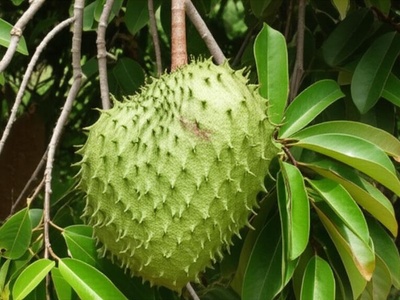
Bwa Zako
The Soursop tree, introduced for its large, spiny, edible fruit. It has naturalized in many areas and is a common feature in home gardens and on the edge of forests.
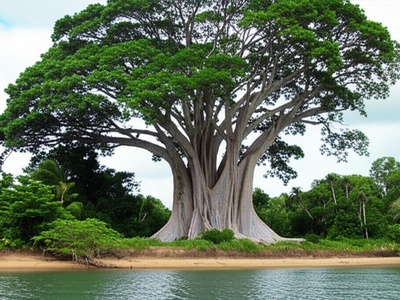
Figye Banann
A large endemic fig tree, often found along rivers. It is a keystone species, providing an essential food source for the Seychelles Fruit Bat and various bird species.
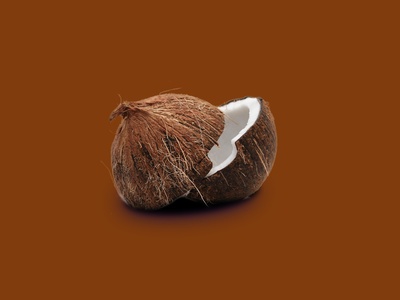
Bwa Koko
A beautiful coastal tree with large, glossy leaves. It has stunning, fragrant flowers with pink-tipped white stamens that open at night. Its boxy, buoyant fruits are dispersed by the ocean.
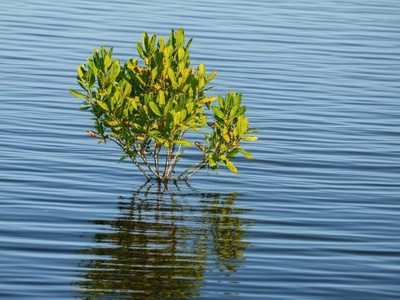
Bwa Gato
A small tree found in wet, coastal habitats. It is an unassuming but important part of the native wetland flora, contributing to the stability of these fragile ecosystems.
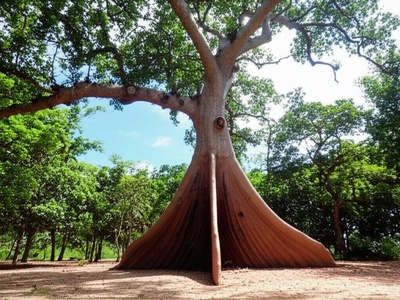
Bwa Ker
A large, valuable timber tree, also known as Borneo Teak or Merbau. It has a buttressed trunk and is now rare in Seychelles due to historical logging, but persists in some coastal forests.

Bwa Kasan Gran Fey
An endemic pioneer tree with very large, shield-shaped leaves. It is common in disturbed areas and forest gaps, where its rapid growth helps to quickly re-establish forest cover.
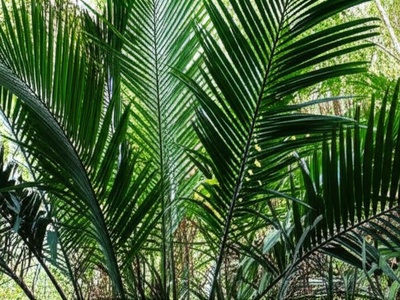
Bwa Le Seve
A slender, spiny understory palm. It is relatively common in forests from sea level up to about 500 meters, often found growing in clumps. Its seeds are kidney-shaped.
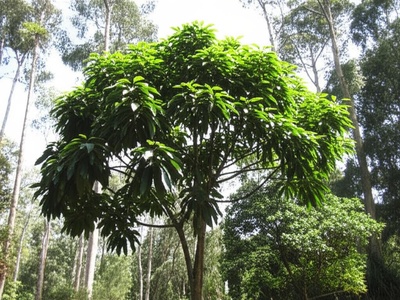
Bwa Fow
A medium-sized tree of mid-altitude forests. It has a straight trunk and a dense crown of glossy leaves. An important but often overlooked member of the native forest canopy.
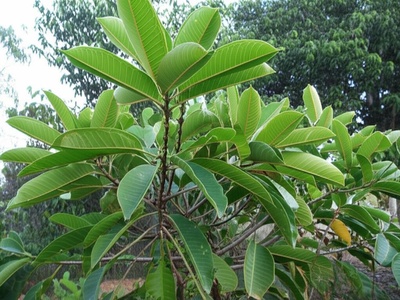
Kafe Sovaz
A small to medium-sized tree from the coffee family, found in forests. It has large, glossy leaves and is an important part of the endemic flora, though not well known.
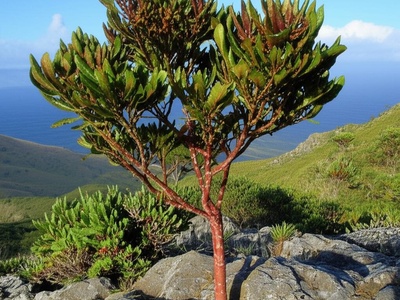
Bwa Rouj
A small tree found in higher-altitude forests, particularly on exposed ridges and rock faces. It is a rare, Vulnerable species with a very limited distribution.
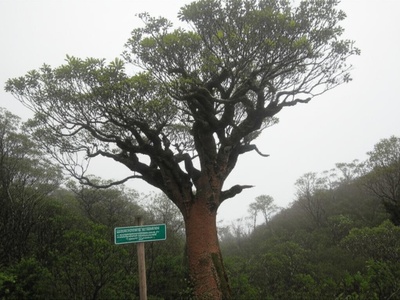
Bwa Dyanmanti
A rare tree found in high-altitude forests. It is Critically Endangered, with only a very small number of mature individuals known to exist, making it a high priority for conservation.
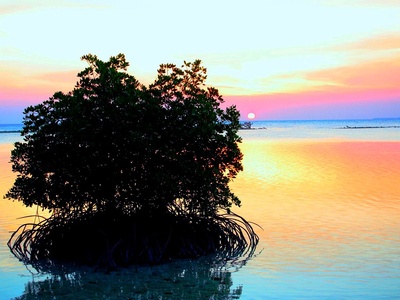
Le Manglier
A small mangrove tree found on the landward edge of mangrove forests. It is less common than other mangroves and is distinguished by its small leaves and white flowers.

Bwa Pti Fey
A small tree with small, neat leaves, found in a range of forest types from coastal to mountain. It produces small, edible berries and is an important part of the forest understory.
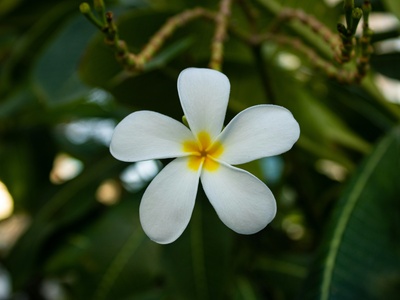
Frangipani
A popular ornamental tree, originally from Central America, now widely naturalized, especially near beaches and settlements. Famous for its waxy, fragrant flowers and milky, toxic sap.
